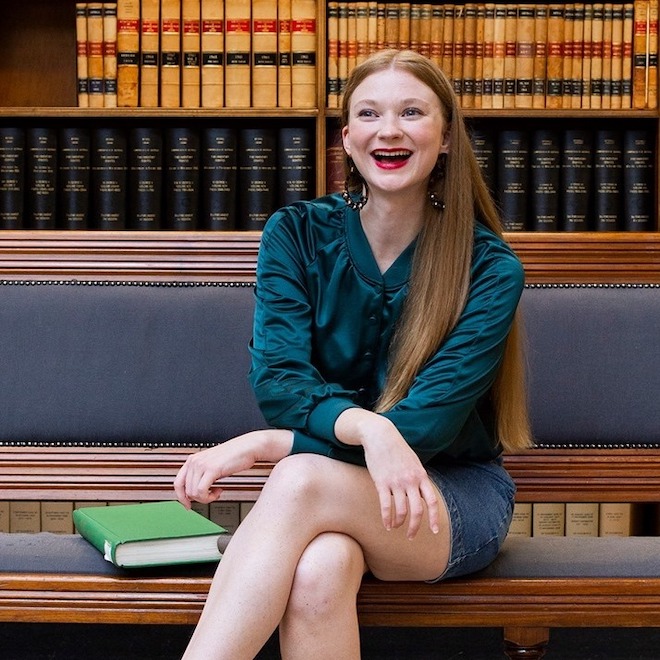The "academy" under assault
 Book review •
Book review •  Friday, August 20, 2021
Friday, August 20, 2021 Book worm review by Anna Kretowicz ... Who Gets to be Smart ... A broken education system propping up the old world order ... The "truth" behind Rhodes and his scholars ... Production mill for elites ... Confusion and insecurities abound
 Lee: power, privilege and knowledge
Lee: power, privilege and knowledge
Who gets to be smart? author Bri Lee asks in her latest book - adorned with glowing endorsements from the likes of Christos Tsiolkas, millennial influencer Flex Mami, journalist Rick Morton and politician Mehreen Faruqi.
Her answer is astoundingly simple: a "secret society of superior men who would work to advance the interests of [the] great Anglo-Saxon Empire".
Granted, she uses a few other less brazen phrases, but without much more nuance. Her finger remains steadfastly pointed at men like Cecil Rhodes, former prime ministers Tony Abbott and John Howard, and past University of Queensland law dean Patrick Parkinson.
Following Eggshell Skull and Beauty, Lee now canvasses the brokenness of the Australian education system. It's a tenacious exploration of how privilege, power and knowledge are deeply interwoven and it asks some serious questions, yet her answers indicate she bit off more than she could chew.
Swinging from personal anecdotes and Lee's reckoning with her own understanding of what it means to be "smart", to scientific research on bilingualism, to joining the pile-on with "Rhodes Must Fall" - the book is confused.
It begins with a personal anecdote, a recounting of Lee's visit to Oxford, where she stayed with close friend and Rhodes Scholar, Damian. The paradigm of "smart", Oxford seems like a good launching pad to examine the relationship between power, privilege and knowledge. However, Lee's analysis is tied closely with her own insecurities.
Vulnerability can be a useful tool to invite the reader closer, to imbue an otherwise dry argument with emotional force. But not here.
The author's self-flagellation, describing herself as a "delusional Cinderella ... alone in my room with my not-good-enough brain", sits uncomfortably with the objective criticisms she seeks to make.
She admits that she "wished they had been mean or rude, these Rhodes scholars, so that I could resent them for valid reasons instead of my own insecurity, but no such luck".
Granted, by the end of the book she seems to have turned a new leaf - described as casting away from "so many posts ... first justice [a reference to Eggshell Skull], then the body [Beauty], and now the mind".
Personal experience adds value and depth to criticism, but the depth of her insecurity felt difficult to disentangle from her arguments.
Lee has done her research. There are podcasts, news articles and reports galore to support her claims. It puts her own voice at a distance when sentence after sentence begins: "In [insert podcast, report, news article, think piece here] ..."
Sometimes she does little more than extract the relevant chunk of text before moving on.
It felt like reading an anthology of ABC and The Conversation articles, leaving little room for more depth and rigour.
Moreover, when Lee referred to articles and reports to exemplify the abhorrent views of those in "the Academy" (the name she gave to the almighty infrastructure of universities, colleges, conferences, and professorships), she often derided them.
For example, quoting Scott Prasser, then-executive director of the Public Policy Institute at the Australian Catholic University, in The Conversation, she says it's:
"... the second-most stupid thing I've ever read ... And oh, look, how interesting: Prasser left the university and now works for the Centre for Independent Studies."
While she claims that she would be "crushed" if her partner Vincent ever called her "stupid", she also uses this as a legitimate criticism of the views of those with whom she disagrees.
Lee does show a degree of introspection and self-interrogation at times, such as admitting that she had an "irrational predisposition ... to judge harshly people who don't read the news and keep abreast of national and global goings-on".
She asserted that naivety, one of the opposites of intelligence, could be cured easily "with a daily dose of the ABC, BBC, and New York Times".
 None of this is to say that Lee didn't make some fair, and much-needed, observations. She makes good critiques of how "the Academy" gives primacy to whiteness, with the consequence in Australia of shutting out our Indigenous history and entrenching disadvantage.
None of this is to say that Lee didn't make some fair, and much-needed, observations. She makes good critiques of how "the Academy" gives primacy to whiteness, with the consequence in Australia of shutting out our Indigenous history and entrenching disadvantage.
She reveals the consequences that a singular concept of "intelligence" can have on those with disabilities, and questions how and why we attach a moral value to being "smart".
But Lee's missteps clouded these points, making the book feel more unbudging and forceful in its arguments than informative and inviting. She makes robust conclusions, but it often felt as if it were coming from a place as set in its ways as the one she was criticising.
Anna Kretowicz
Who Gets to be Smart - Privilege, Power and Knowledge by Bri Lee, Allen & Unwin, $29.99










Reader Comments